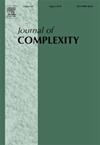Tractability of linear ill-posed problems in Hilbert space
IF 1.8
2区 数学
Q1 MATHEMATICS
引用次数: 0
Abstract
We introduce a notion of tractability for ill-posed operator equations in Hilbert space. For such operator equations the asymptotics of the best possible rate of reconstruction in terms of the underlying noise level is known in many cases. However, the relevant question is, which level of discretization, again driven by the noise level, is required in order to achieve this best possible accuracy. The proposed concept adapts the one from Information-based Complexity. Several examples indicate the relevance of this concept in the light of the curse of dimensionality.
希尔伯特空间线性问题的可解决性
我们引入了希尔伯特空间中难解算子方程的可操作性概念。对于此类算子方程,在许多情况下,根据基本噪声水平,最佳重构率的渐近线是已知的。然而,相关的问题是,同样是由噪声水平驱动,需要哪种离散化程度才能达到最佳精度。所提出的概念是对基于信息的复杂性概念的调整。有几个例子表明了这一概念与维度诅咒的相关性。
本文章由计算机程序翻译,如有差异,请以英文原文为准。
求助全文
约1分钟内获得全文
求助全文
来源期刊

Journal of Complexity
工程技术-计算机:理论方法
CiteScore
3.10
自引率
17.60%
发文量
57
审稿时长
>12 weeks
期刊介绍:
The multidisciplinary Journal of Complexity publishes original research papers that contain substantial mathematical results on complexity as broadly conceived. Outstanding review papers will also be published. In the area of computational complexity, the focus is on complexity over the reals, with the emphasis on lower bounds and optimal algorithms. The Journal of Complexity also publishes articles that provide major new algorithms or make important progress on upper bounds. Other models of computation, such as the Turing machine model, are also of interest. Computational complexity results in a wide variety of areas are solicited.
Areas Include:
• Approximation theory
• Biomedical computing
• Compressed computing and sensing
• Computational finance
• Computational number theory
• Computational stochastics
• Control theory
• Cryptography
• Design of experiments
• Differential equations
• Discrete problems
• Distributed and parallel computation
• High and infinite-dimensional problems
• Information-based complexity
• Inverse and ill-posed problems
• Machine learning
• Markov chain Monte Carlo
• Monte Carlo and quasi-Monte Carlo
• Multivariate integration and approximation
• Noisy data
• Nonlinear and algebraic equations
• Numerical analysis
• Operator equations
• Optimization
• Quantum computing
• Scientific computation
• Tractability of multivariate problems
• Vision and image understanding.
 求助内容:
求助内容: 应助结果提醒方式:
应助结果提醒方式:


